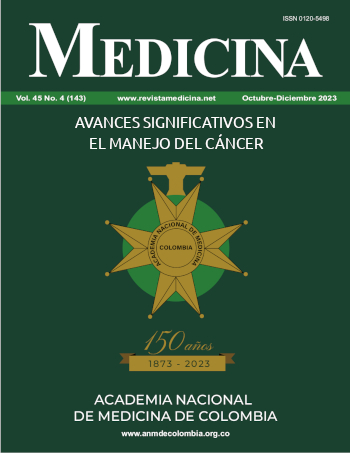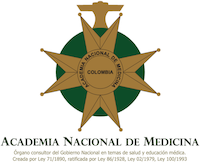Manejo en cuidado crítico de la toxicidad severa relacionada con la inmunoterapia en cáncer
DOI:
https://doi.org/10.56050/01205498.2307Resumen
En los últimos años, la inmunoterapia en oncología ha revolucionado el pronóstico de los pacientes con cáncer al dirigirse específicamente a las complejas interacciones entre las células tumorales y el huésped. Aunque estas terapias han mejorado significativamente las tasas de supervivencia, su aumento en uso ha llevado consigo la aparición de eventos adversos conocidos como irAEs. Estos incluyen una variedad de afecciones como alteraciones dermatológicas, endocrinas, gastrointestinales, el síndrome de liberación de citocinas (CRS), hipofisitis, neumonitis, miocarditis, meningitis y el síndrome de neurotoxicidad asociado a células efectoras inmunitarias (ICANS), así como las infecciones asociadas. En este artículo se describen detalladamente los irAEs más comunes, desde su epidemiología hasta su clasificación y diagnóstico, se exploran los posibles tratamientos para los casos más graves que requieren ingreso en unidades de cuidados intensivos (UCI), lo que incluye la suspensión de la inmunoterapia y medidas de soporte orgánico para ganar tiempo en eventos potencialmente reversibles. En la mayoría de las reacciones graves se utilizan corticosteroides y otras terapias inmunosupresoras para controlar la respuesta autoinmune. El conocimiento profundo de estos fenómenos de toxicidad es esencial para los médicos encargados del seguimiento de pacientes oncológicos, tanto en entornos ambulatorios como hospitalarios como para el personal asistencial de las unidades de cuidado intensivos, ya que la identificación temprana, el reporte adecuado y un manejo multidisciplinario pueden cambiar el curso de eventos potencialmente desfavorables. Este enfoque integral es fundamental para mejorar los desenlaces clínicos y la calidad de vida de los pacientes que se someten a inmunoterapia en el contexto oncológico.
Biografía del autor/a
Víctor Hugo Nieto Estrada, Centro de Tratamiento e Investigación sobre Cáncer (CTIC)
Unidad Funcional Asistencial Cuidado Intensivo, Centro de Tratamiento e Investigación sobre Cáncer Luis Carlos Sarmiento Angulo (CTIC) / Grupo de investigación GIGA, Bogotá, Colombia
Daniel Molano Franco, Centro de Tratamiento e Investigación sobre Cáncer (CTIC)
Unidad Funcional Asistencial Cuidado Intensivo, Centro de Tratamiento e Investigación sobre Cáncer Luis Carlos Sarmiento Angulo (CTIC) / Grupo de investigación GIGA, Bogotá, Colombia
Anacaona Martínez del Valle, Grupo GriBos, Bogotá
Departamento de Epidemiología, Grupo GriBos, Bogotá, Colombia
Carola Giménez-Esparza Vich, Sociedad Española de Medicina Intensiva
Médico Intensivista, Sociedad Española de Medicina Intensiva, Critica y Unidades Coronarias, Madrid, España.
Referencias bibliográficas
Zhang Q, Huo G wei, Zhang H zhen, Song Y. Efficacy of pembrolizumab for advanced/metastatic melanoma: a meta-analysis. Open Medicine. 2020;15(1):447-56.
Locke FL, Neelapu SS, Bartlett NL, Siddiqi T, Chavez JC, Hosing CM, et al. Phase 1 Results of ZUMA-1: A Multicenter Study of KTE-C19 Anti-CD19 CAR T Cell Therapy in Refractory Aggressive Lymphoma. Mol Ther. 2017;25(1):285-95.
Gutierrez C, McEvoy C, Munshi L, Stephens RS, Detsky ME, Nates JL, et al. Critical Care Management of Toxicities Associated With Targeted Agents and Immunotherapies for Cancer. Critical Care Medicine. 2020;48(1):10-21.
De Velasco G, Je Y, Bossé D, Awad MM, Ott PA, Moreira RB, et al. Comprehensive Meta-analysis of Key Immune-Related Adverse Events from CTLA-4 and PD-1/PD-L1 Inhibitors in Cancer Patients. Cancer Immunol Res. 2017;5(4):312-8.
Khoja L, Day D, Wei-Wu Chen T, Siu LL, Hansen AR. Tumourand class-specific patterns of immune-related adverse events of immune checkpoint inhibitors: a systematic review. Ann Oncol. 2017;28(10):2377-85.
Shimabukuro-Vornhagen A, Böll B, Schellongowski P, Valade S, Metaxa V, Azoulay E, et al. Critical care management of chimeric antigen receptor T‐cell therapy recipients. CA A Cancer J Clinicians. 2022;72(1):78-93.
Tay SH, Toh MMX, Thian YL, Vellayappan BA, Fairhurst AM, Chan YH, et al. Cytokine Release Syndrome in Cancer Patients Receiving Immune Checkpoint Inhibitors: A Case Series of 25 Patients and Review of the Literature. Front Immunol. 2022;13:807050.
Lee DW, Santomasso BD, Locke FL, Ghobadi A, Turtle CJ, Brudno JN, et al. ASTCT Consensus Grading for Cytokine Release Syndrome and Neurologic Toxicity Associated with Immune Effector Cells. Biology of Blood and Marrow Transplantation. 2019;25(4):625-38.
Thompson JA, Schneider BJ, Brahmer J, Achufusi A, Armand P, Berkenstock MK, et al. Management of Immunotherapy-Related Toxicities, Version 1.2022, NCCN Clinical Practice Guidelines in Oncology. Journal of the National Comprehensive Cancer Network. 2022;20(4):387-405.
Kennedy LB, Salama AKS. A review of cancer immunotherapy toxicity. CA Cancer J Clin. 2020;70(2):86-104.
Gust J, Hay KA, Hanafi LA, Li D, Myerson D, Gonzalez-Cuyar LF, et al. Endothelial Activation and Blood–Brain Barrier Disruption in Neurotoxicity after Adoptive Immunotherapy with CD19 CAR-T Cells. Cancer Discovery. 2017;7(12):1404-19.
Santomasso BD, Park JH, Salloum D, Riviere I, Flynn J, Mead E, et al. Clinical and Biological Correlates of Neurotoxicity Associated with CAR T-cell Therapy in Patients with B-cell Acute Lymphoblastic Leukemia. Cancer Discovery. 2018;8(8):958-71.
Chhabra N, Kennedy J. A Review of Cancer Immunotherapy Toxicity: Immune Checkpoint Inhibitors. J Med Toxicol. 2021;17(4):411-24.
Vaddepally R, Doddamani R, Sodavarapu S, Madam NR, Katkar R, Kutadi AP, et al. Review of Immune-Related Adverse Events (irAEs) in Non-Small-Cell Lung Cancer (NSCLC)—Their Incidence, Management, Multiorgan irAEs, and Rechallenge. Biomedicines. 2022;10(4):790.
Puzanov I, Diab A, Abdallah K, Bingham CO, Brogdon C, Dadu R, et al. Managing toxicities associated with immune checkpoint inhibitors: consensus recommendations from the Society for Immunotherapy of Cancer (SITC) Toxicity Management Working Group. J Immuno Therapy Cancer. 2017;5(1):95. doi: 10.1186/s40425-017-0300-z
Mahalingam P, Newsom-Davis T. Cancer immunotherapy and the management of side effects. Clin Med. 2023;23(1):56-60.
Johnson DB, Nebhan CA, Moslehi JJ, Balko JM. Immune-checkpoint inhibitors: long-term implications of toxicity. Nat Rev Clin Oncol. 2022;19(4):254-67.
Abu-Sbeih H, Herrera LN, Tang T, Altan M, Chaftari AMP, Okhuysen PC, et al. Impact of antibiotic therapy on the development and response to treatment of immune checkpoint inhibitor-mediated diarrhea and colitis. j immunotherapy cancer. 2019;7(1):242.
Wang Y, Wiesnoski DH, Helmink BA, Gopalakrishnan V, Choi K, DuPont HL, et al. Fecal microbiota transplantation for refractory immune checkpoint inhibitor-associated colitis. Nat Med. ;24(12):1804-8.
Pillai RN, Behera M, Owonikoko TK, Kamphorst AO, Pakkala S, Belani CP, et al. Comparison of the toxicity profile of PD-1 versus PD-L1 inhibitors in non-small cell lung cancer: A systematic analysis of the literature. Cancer. 2018;124(2):271-7.
Naidoo J, Wang X, Woo KM, Iyriboz T, Halpenny D, Cunningham J, et al. Pneumonitis in Patients Treated With Anti-Programmed Death-1/Programmed Death Ligand 1 Therapy. J Clin Oncol. 2017;35(7):709-17.
Lemiale V, Meert AP, Vincent F, Darmon M, Bauer PR, Van de Louw A, et al. Severe toxicity from checkpoint protein inhibitors: What intensive care physicians need to know? Ann Intensive Care. 2019;9(1):25.
Haanen J, Obeid M, Spain L, Carbonnel F, Wang Y, Robert C, et al. Management of toxicities from immunotherapy: ESMO Clinical Practice Guideline for diagnosis, treatment and follow-up. Ann Oncol. 2022;33(12):1217-38.
Wang DY, Salem JE, Cohen JV, Chandra S, Menzer C, Ye F, et al. Fatal Toxic Effects Associated With Immune Checkpoint Inhibitors: A Systematic Review and Meta-analysis. JAMA Oncol. 2018;4(12):1721-8.
Heinzerling L, Ott PA, Hodi FS, Husain AN, Tajmir-Riahi A, Tawbi H, et al. Cardiotoxicity associated with CTLA4 and PD1 blocking immunotherapy. J Immunother Cancer. 2016;4:50.
Varricchi G, Galdiero MR, Marone G, Criscuolo G, Triassi M, Bonaduce D, et al. Cardiotoxicity of immune checkpoint inhibitors. ESMO Open. 2017;2(4):e000247.
Wang DY, Okoye GD, Neilan TG, Johnson DB, Moslehi JJ. Cardiovascular Toxicities Associated with Cancer Immunotherapies. Curr Cardiol Rep. 2017;19(3):21.
Nannini S, Koshenkova L, Baloglu S, Chaussemy D, Noël G, Schott R. Immune-related aseptic meningitis and strategies to manage immune checkpoint inhibitor therapy: a systematic review. J Neurooncol. 2022;157(3):533-50.
Thouvenin L, Olivier T, Banna G, Addeo A, Friedlaender A. Immune checkpoint inhibitor-induced aseptic meningitis and encephalitis: a case-series and narrative review. Therapeutic Advances in Drug Safety. 2021;12:204209862110047.
Bier G, Klumpp B, Roder C, Garbe C, Preibsch H, Ernemann U, et al. Meningeal enhancement depicted by magnetic resonance imaging in tumor patients: neoplastic meningitis or therapy-related enhancement? Neuroradiology. 2019;61(7):775-82.
Touat M, Talmasov D, Ricard D, Psimaras D. Neurological toxicities associated with immune-checkpoint inhibitors. Current Opinion in Neurology. 2017;30(6):659-68.
Brahmer JR, Lacchetti C, Schneider BJ, Atkins MB, Brassil KJ, Caterino JM, et al. Management of Immune-Related Adverse Events in Patients Treated With Immune Checkpoint Inhibitor Therapy: American Society of Clinical Oncology Clinical Practice Guideline. JCO. 2018;36(17):1714-68.
Bertaglia V, Morelli AM, Solinas C, Aiello MM, Manunta S, Denaro N, et al. Infections in lung cancer patients undergoing immunotherapy and targeted therapy: An overview on the current scenario. Critical Reviews in Oncology/Hematology. 2023;184:103954.
Fujita K, Terashima T, Mio T. Anti-PD1 Antibody Treatment and the Development of Acute Pulmonary Tuberculosis. Journal of Thoracic Oncology. 2016;11(12):2238-40.
Fujita K, Kim YH, Kanai O, Yoshida H, Mio T, Hirai T. Emerging concerns of infectious diseases in lung cancer patients receiving immune checkpoint inhibitor therapy. Respiratory Medicine. 2019;146:66-70.
Maschmeyer G, Helweg-Larsen J, Pagano L, Robin C, Cordonnier C, Schellongowski P. ECIL guidelines for treatment of Pneumocystis jirovecii pneumonia in non-HIV-infected haematology patients. Journal of Antimicrobial Chemotherapy. 2016;71(9):2405-13.
Hellmann MD, Paz-Ares L, Bernabe Caro R, Zurawski B, Kim SW, Carcereny Costa E, et al. Nivolumab plus Ipilimumab in Advanced Non–Small-Cell Lung Cancer. N Engl J Med. 2019;381(21):2020-31.
Herbst RS, Baas P, Kim DW, Felip E, Pérez-Gracia JL, Han JY, et al. Pembrolizumab versus docetaxel for previously treated, PD-L1-positive, advanced non-small- cell lung cancer (KEYNOTE-010): a randomised controlled trial. The Lancet. 2016;387(10027):1540-50.
Schwarz M, Kocher F, Niedersuess-Beke D, Rudzki J, Hochmair M, Widmann G, et al. Immunosuppression for Immune Checkpoint-related Toxicity Can Cause Pneumocystis Jirovecii Pneumonia (PJP) in Non– small-cell Lung Cancer (NSCLC): A Report of 2 Cases. Clinical Lung Cancer. 2019;20(3):e247-50.
Sadek M, Loizidou A, Drowart A, Van Den Wijngaert S, Gomez-Galdon M, Aspeslagh S. Pneumocystis Infection in Two Patients Treated with Both Immune Checkpoint Inhibitor and Corticoids. Journal of Immunotherapy and Precision Oncology. 2020;3(1):27-30.
Johncilla M, Misdraji J, Pratt DS, Agoston AT, Lauwers GY, Srivastava A, et al. Ipilimumab-associated Hepatitis: Clinicopathologic Characterization in a Series of 11 Cases. Am J Surg Pathol. 2015;39(8):1075-84.
Lute KD, May KF, Lu P, Zhang H, Kocak E, Mosinger B, et al. Human CTLA4 knock-in mice unravel the quantitative link between tumor immunity and autoimmunity induced by anti-CTLA-4 antibodies. Blood. 2005;106(9):3127-33.
Cortazar FB, Marrone KA, Troxell ML, Ralto KM, Hoenig MP, Brahmer JR, et al. Clinicopathological features of acute kidney injury associated with immune checkpoint inhibitors. Kidney Int. 2016;90(3):638-47.
Petrelli F, Ardito R, Borgonovo K, Lonati V, Cabiddu M, Ghilardi M, et al. Haematological toxicities with immunotherapy in patients with cancer: a systematic review and meta-analysis. Eur J Cancer. 2018;103:7-16.
Healey Bird B, Nally K, Ronan K, Clarke G, Amu S, Almeida AS, et al. Cancer Immunotherapy with Immune Checkpoint Inhibitors-Biomarkers of Response and Toxicity; Current Limitations and Future Promise. Diagnostics. 2022;12(1):124.
Conroy M, Naidoo J. Immune-related adverse events and the balancing act of immunotherapy. Nat Commun. 2022;13(1):392.
Mazzarella L, Giugliano S, D’Amico P, Belli C, Duso BA, Rescigno M, et al. Evidence for interleukin 17 involvement in severe immune-related neuroendocrine toxicity. European Journal of Cancer. 2020;141:218-24.
Callahan MK, Yang A, Tandon S, Xu Y, Subudhi SK, Roman RA, et al. Evaluation of serum IL-17 levels during ipilimumab therapy: Correlation with colitis. JCO. 2011;29(15_suppl):2505-2505.
Weidhaas J, Marco N, Scheffler AW, Kalbasi A, Wilenius K, Rietdorf E, et al. Germline biomarkers predict toxicity to anti-PD1/PDL1 checkpoint therapy. J Immunother Cancer. 2022;10(2):e003625.
Cómo citar
Descargas
Publicado
Número
Sección
Licencia
Copyright
ANM de Colombia
Los autores deben declarar revisión, validación y aprobación para publicación del manuscrito, además de la cesión de los derechos patrimoniales de publicación, mediante un documento que debe ser enviado antes de la aparición del escrito. Puede solicitar el formato a través del correo revistamedicina@anmdecolombia.org.co o descargarlo directamente Documento Garantías y cesión de derechos.docx
Copyright
ANM de Colombia
Authors must state that they reviewed, validated and approved the manuscript's publication. Moreover, they must sign a model release that should be sent.





